Because it’s our favorite way to camp, we talk a lot about boondocking. But what about overlanding? People often use those two terms interchangeably. But what is overlanding? Is it the same as boondocking? Although there are similarities, there are differences, too.
In this post, we’re discussing boondocking vs overlanding — how they’re the same and how they’re different.
What Is Boondocking?
Boondocking, sometimes referred to as dispersed camping, wild camping, or off-grid camping, refers to camping in areas away from established campgrounds. That means no access to things like electricity, water & sewer hookups, or designated campsites. While overnighting in a Wal-Mart lot is also sometimes referred to as “boondocking,” we’re primarily talking about heading out to far more remote locations.
Although you can boondock almost anywhere it’s permitted, many RVers seek out remote or undeveloped areas for their boondocking experiences. That’s what we prefer — secluded camping in places of dramatic natural beauty — true off-grid RV boondocking.
Besides BLM (Bureau of Land Management) land, open deserts, and other public lands, places like national parks and forests, state and provincial parks, and even private property can provide awesome off-grid experiences, even if somewhat more developed.
Boondockers generally enjoy the solitude found in nature, a trait they share with overlanders.
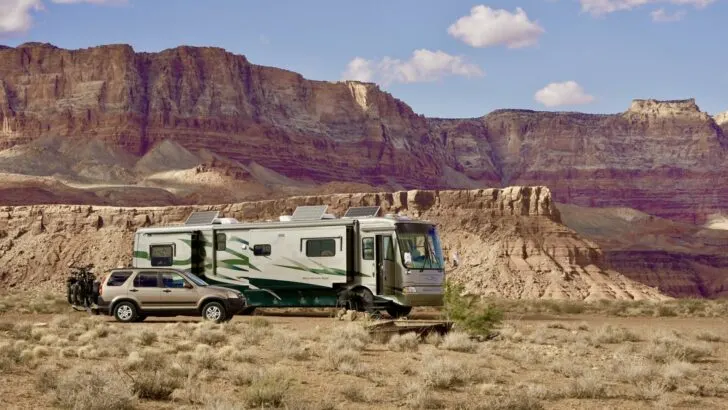
Here we are boondocking in the Arizona desert, our favorite way to RV. We often stay in remote places like this for two weeks at a time or more. But our diesel pusher’s size, weight, and ground clearance limited the places we could access. The road into this location is easier to navigate than a real overlanding route. If it hadn’t been, we wouldn’t have been able to access it.
There are several key features of boondocking:
Off-Grid Camping
Boondockers camp in locations that aren’t equipped with traditional campground facilities. They rely on their own resources and equipment to set up camp and enjoy the outdoors, whether they’re camping in RVs, tents, small campers, or camper vans.
Remote Locations
Boondocking sites are often located far from civilization, providing campers with privacy, peace, and quiet. The sites may be accessible via paved or dirt roads, trails, expansive desert areas, or firm beach sand. They often provide stunning natural scenery, such as mountain vistas, desert landscapes, forested areas, or the oceanside.
As mentioned above, overnighting at a Wal-Mart can sometimes be referred to as boondocking because there are no hook-ups. But the term really refers to camping in remote natural settings, not parking lots.
Minimalist Lifestyle
Many boondockers embrace a minimalist approach to camping, carrying only essential gear and supplies. Since we camped in a highly-equipped diesel pusher for more than 20 years, we can’t really call ourselves minimalists. Others boondock comfortably off the grid in tents, vans, travel trailers, 5th wheels, or even in cars.
But regardless of the type of vehicle you drive, boondockers need to be adaptable when camping in remote areas. This of course includes being careful about water use, holding tank capacities, and power.
Even a Big Rig like our 43′ Mountain Aire never stopped us from being frugal with resources. For example, we lived comfortably off the grid for two full weeks at a stretch using only about 100 gallons of fresh water. That’s very minimal compared with the vast majority of people living in sticks & bricks houses.
We also installed excellent RV solar panels and lithium batteries, dramatically limiting the need for our built-in Onan generator. The fuel savings (and peace & quiet) definitely help us maintain our minimalist cred out in the boonies!
Freedom, Solitude, and Independence
One of the greatest things about boondocking is the freedom to camp (mostly) wherever you choose, without the constraints of traditional campgrounds. That includes the need to make reservations and having lots of other campers all around you. Many boondockers, including us, prefer heading off the beaten path. We’d rather be surrounded by nature, without the crowds or noise often found in more developed camping areas.
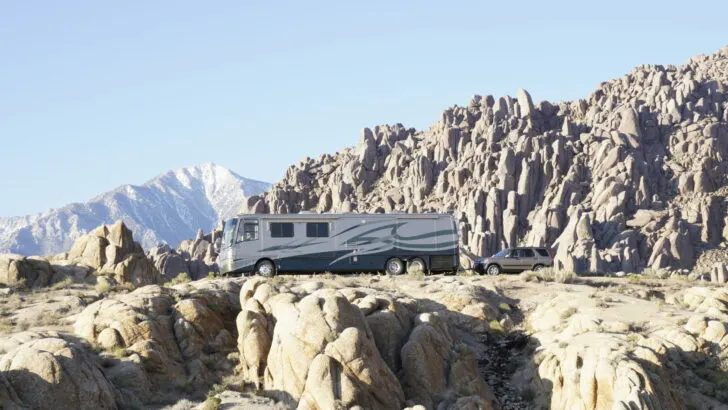
Boondocking in remote places like this fantastic spot in California takes us off the beaten path. But we obviously didn’t need a 4WD rig to get there. If we had, this would more likely be considered an Overlanding location.
Respect for the Environment
Responsible boondockers practice Leave No Trace principles, minimizing their impact on the environment and leaving campsites in the same condition (or even better) than they found them. This applies whether camping in a national park or a remote desert location.
You can read more about Leave No Trace in our post “What Is Dispersed Camping & Why Do We Love It So Much?”
We encourage others to try boondocking because we think it significantly enhances the camping experience and exposes RVers to the beauty and serenity of nature in new ways.
For more information on boondocking, see our complete guide to Class A RV boondocking, our post on the 11 best ways to find RV boondocking spots, and our 27 boondocking tips. We even share Why we face East when RV boondocking.
One of our favorite ways to find great boondocking spots is using Campendium, which is now part of Roadpass Pro. You can learn more about all the great Roadpass benefits at the following link, and even get a special discount when you sign up.
Upgrade your RVing experience with Roadpass Plus. One annual subscription gets you access to Roadtrippers Plus (a comprehensive trip planner), Campendium (for finding free boondocking spots all...Show More
Upgrade your RVing experience with Roadpass Plus. One annual subscription gets you access to Roadtrippers Plus (a comprehensive trip planner), Campendium (for finding free boondocking spots all over North America), OvernightRVParking.com (for finding free overnight RV parking spots), RV-Safe GPS (for RV-specific turn-by-turn navigation), and access to savings on RV Tires (save up to 45% on major brands).
Save $10 on your subscription when you sign up using coupon code RVGEEKS.
Show LessWhat Is Overlanding?
The term Overlanding, sometimes referred to as 4WD Touring, refers to traveling an unimproved (or minimally improved) route to a remote camping destination. Since it generally involves mechanized means of travel, it can include everything from bicycles to trucks to cars to RVs. Overlanding RVers typically travel in four-wheel-drive vehicles or smaller RVs with specialized suspensions.
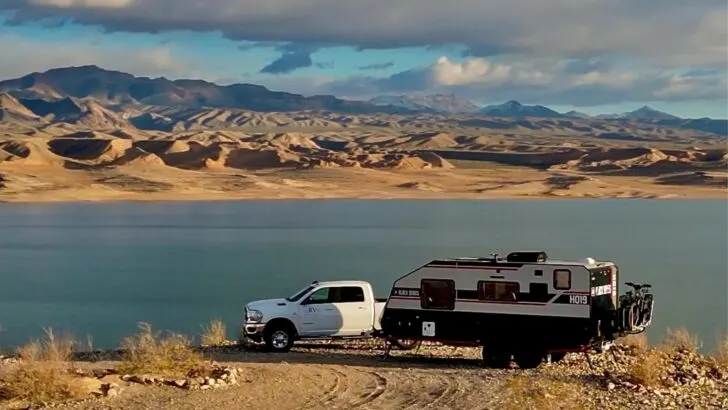
Campers with rugged suspensions like this Black Series HQ19 are better suited for overlanding than a traditional RV. We spent over a month exploring remote places in this rig, pictured here overlooking Lake Mead.
Overlanding is similar to boondocking in many ways, but there are also a few key differences. Overlanding is often focused on traveling long distances over rugged terrain or remote areas. It can also involve traveling for an extended period, sometimes spanning weeks, months, or even years. Overlanding can be more about the journey itself, rather than reaching a specific destination quickly.
Overland travel typically involves specially equipped vehicles, such as heavy-duty 4×4 trucks, SUVs, or lifted camper vans, carrying all necessary supplies and equipment to sustain themselves for extended periods. They typically, but not exclusively, tend to travel to very remote destinations. Overlanding emphasizes exploration, self-reliance, adventure, and a sort of cultural immersion.
Let’s look at a few key features of overlanding to see how it’s similar to and different from boondocking:
Specialized Vehicles
As mentioned, Overlanders typically use specially equipped vehicles, such as 4×4 trucks, SUVs, lifted camper vans, or expedition vehicles, to travel over various types of terrain. Overlanding vehicles are often modified with off-road capabilities far beyond the average RV, extra storage space for supplies, and in many cases, living quarters to provide comfort during long journeys.
High ground clearance and the ability to maintain traction on loose, uneven, and/or steep surfaces are key features of many overlanding vehicles.
Self-Reliance and Self-Sufficiency
Overland trips require travelers to be self-reliant, carrying all necessary equipment, supplies, and provisions needed to sustain themselves in remote areas, sometimes for extended periods. This can be considerable depending on the length of intended travel and generally includes food, water, shelter, fuel, tools, spare parts, and emergency gear.
Overlanders often develop skills in off-road travel and navigation, vehicle maintenance, outdoor survival, and resourcefulness to handle any challenges they may encounter.
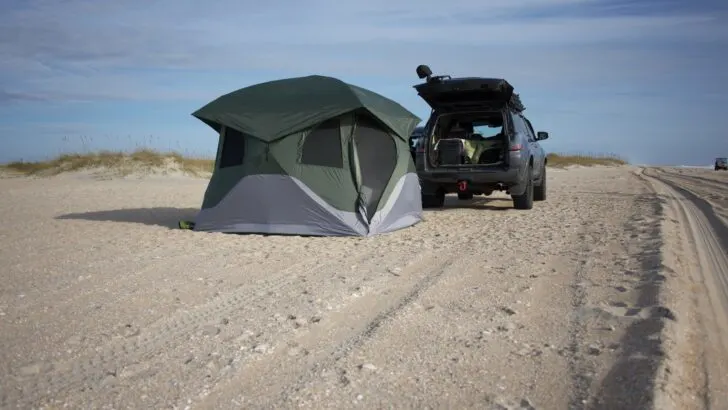
Some overlanders travel in compact 4WD vehicles and use tents for camping.
Exploration and Adventure
While boondocking is about exploring areas that are off the beaten path, overlanding can take it to another level. It can include very remote wilderness areas and challenging terrain inaccessible to ordinary vehicles. This can be a big difference in Overlanding vs RVing. Overland adventurers often embrace challenges and the unknown and love to deeply explore the natural world.
Cultural Immersion
For some, overlanding involves traveling through different countries or regions where they can experience diverse cultures and traditions. Interaction with local communities and learning about their way of life is an integral part of this aspect of the overlanding experience.
Minimal Environmental Impact
Like serious boondockers, responsible overlanders practice Leave No Trace principles, minimizing their impact on the environment and respecting the natural landscapes they encounter. They’re equipped to pack out their trash, stay on designated trails, and respect wildlife habitats.
This is one area where attitudes may differ among Overlanders. Some hard-core off-road explorers may consider it acceptable to blaze completely new trails/paths/routes where none existed before. Others stick to well-worn (although still challenging) routes that won’t create new trails on previously undisturbed landscapes.
Summary of Boondocking vs Overlanding
As you can see, there are many similarities between boondocking and overlanding. But overlanding offers a unique and immersive way to travel off-road and off the grid, allowing adventurers to explore remote, wild places, sometimes over extended travel periods.
Both are traveling styles that appeal to those who seek freedom, adventure, and a deeper connection with the world around them. But overlanding takes the boondocking experience deeper into areas not accessible to most vehicles.
We experienced this ourselves when we spent over a month in a Black Series HQ19 off-road camper. We were able to access places that were much further off the grid than our motorhome could ever manage. Since it takes a very capable RV to get to the spots, it made sure that we were much more alone than usual. Since we love solitude, it was an eye-opening experience. When we get our new towable (soon!), you’ll see how much further off the grid we’ll be able to camp from now on.
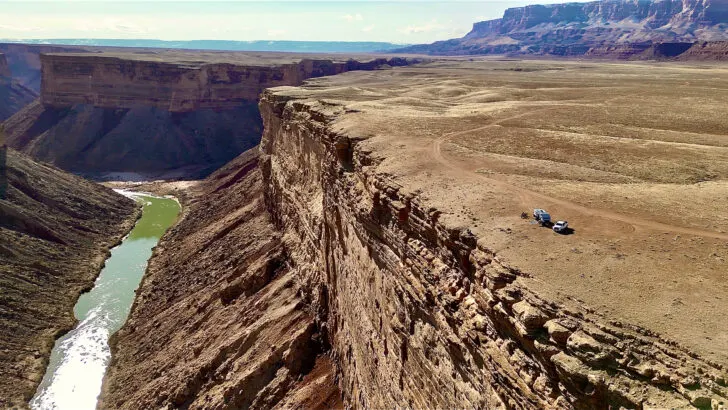
This is a great example of our ability to go overlanding, vs ordinary boondocking, during our month in an off-road camper. The dirt road may look Big Rig friendly, but the last time we were here, it was clear that we could never have gotten our motorhome anywhere near this incredible spot. The entrance road was completely inaccessible to an ordinary RV. Can you spot us sitting on the edge of the cliff to the left of our campsite (we’re just specks!)?
Our favorite way to locate great overlanding locations is iOverlander, which helped us find much more rugged and remote camping than we’d ever experienced before.
If you’d like to see some cool off-road and overlanding capable RVs, check out our posts on off-road RV trailers, pop-up truck campers, the Black Series HQ19, and the Armadillo Conquistador F luxury off-road RV.
Lastly, in 20+ years of boondocking in a diesel pusher, we did push the limits a little too far one time. The following video should serve as a warning to stay in your lane when it comes to off-road RV capabilities. It must have worked for us, since we never let this happen again, despite lots more boondocking after this happened.
Free RVing Tips, Tricks, Reviews & Giveaways
As 20-year full-timers, we share everything we’ve learned about RVing over the years. Join our online community to receive a wealth of great RVing knowledge delivered daily to your inbox.
Whether you’re a new RVer or a seasoned full-timer, you’ll love the wide range of RVing topics we cover. Don’t miss a single article or any of our famous Giveaways. Subscribe to our newsletter today!



John S.
Saturday 9th of March 2024
Well, I think you just dropped a few hints on what we're so excited to see. "Soon".